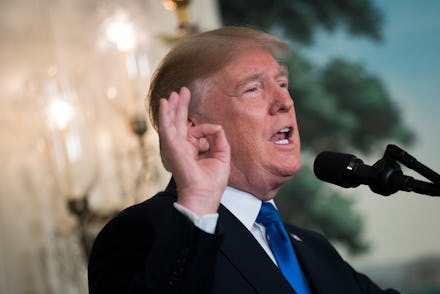Tehran blasts Trump for threat to withdraw from Iran Deal if demands aren’t met

Iran will not bend to President Donald Trump’s demands to change the landmark nuclear deal it reached with the United States in 2015, the country’s foreign ministry announced in a statement to state media Saturday.
“Iran strongly announces that it will make no measure beyond its [Joint Comprehensive Plan of Action] commitments and will make no changes in the nuclear deal neither now nor in the future,” the foreign ministry said.
The statement came a day after Trump again continued the U.S. participation in the accord, but vowed to “withdraw from the deal immediately” if what he described as “flaws” in the agreement aren’t fixed.
“I hereby call on key European countries to join with the United States in fixing significant flaws in the deal, countering Iranian aggression and supporting the Iranian people,” Trump said in a statement. “If other nations fail to act during this time, I will terminate our deal with Iran.”
Trump has long been a critic of the Iran Deal, which was struck by then-President Barack Obama and Iranian President Hassan Rouhani in 2015.
The U.S. agreed to unfreeze tens of billions of dollars of Iran’s assets in exchange for the country reducing its number of uranium enrichment centrifuges and shrinking its uranium stockpile by 98%, which Obama said to Mic at the time “prevents Iran from getting a nuclear weapon.”
But Trump has maintained that the deal was “one of the most incompetent ever made,” and in October 2017 he decertified the agreement.
“We will not continue down a path whose predictable conclusion is more violence, more terror and the very real threat of Iran’s nuclear breakout,” Trump said at the time, adding that the deal would be under “continuous review” and that he reserved the right to leave it at any time.
He continued to waive sanctions against Iran on Friday, but said he was doing so “only in order to secure our European allies’ agreement to fix the terrible flaws of the Iran nuclear deal.”
“This is a last chance,” Trump said. “In the absence of such an agreement, the United States will not again waive sanctions in order to stay in the Iran nuclear deal.”
Trump is calling for the deal to allow “immediate inspections” by the U.S.; to “ensure that Iran never even comes close to possessing a nuclear weapon;” to ensure the deal lasts “forever;” and that not only nuclear testing but also long-range missile testing be “subject to severe sanctions” in the deal.
“If Iran does not comply with any of these provisions, American nuclear sanctions would automatically resume,” Trump said.
Iran on Saturday responded by saying it will “accept no change in the letter and spirit of the nuclear accord,” and called the new sanctions the U.S. imposed on Iranian individuals and organizations “unfair and hostile.”
The back-and-forth follows a period of unrest in Iran, during which people across the country protested against the government over the nation’s struggling economy and high unemployment.
Trump had promised the people of Iran “great support” from the U.S. as they protested the government.
Rouhani had promised that the 2015 deal he struck with Obama and other world leaders would lead to economic improvement, but “Iranians have not seen as robust an economic recovery as many had expected,” according to an October 2017 analysis by Zachary Laub of the Council on Foreign Relations.
Though the protests — the largest in the country since its disputed election in 2009 — eventually swelled to include a range of social issues, they “very much focused on the economic situation,” Narges Bajoghli, a postdoctoral fellow in international and public affairs at the Brown University Watson Institute, said in a phone interview Jan. 3.
Trump has repeatedly talked tough on the country, describing it in a fiery United Nations speech in September 2017 as a “murderous regime” whose chief exports are “violence, bloodshed and chaos.”